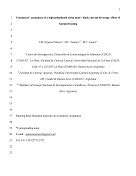Please use this identifier to cite or link to this item:
https://repositorio.uca.edu.ar/handle/123456789/5469| Título: | Consumers' acceptance of a high-polyphenol yerba mate / black currant beverage: effect of repeated tasting | Autor: | Orjuela Palacio, J. M. Zamora, María Clara Lanari, M. C. |
Otros colaboradores: | Universidad Católica Argentina. Facultad de Ciencias Agrarias Universidad Nacional de La Plata. Facultad de Ciencias Exactas Consejo Nacional de Investigaciones Científicas y Técnicas. CONICET. Centro de Investigación y Desarrollo en Criotecnología de Alimentos. CIDCA. |
Palabras clave: | YERBA MATE; ACEPTABILIDAD; EMOCIONES; DEGUSTACION; CONSUMIDORES; GROSELLA | Fecha de publicación: | 2014 | Cita: | Orjuela Palacio, J.M., Zamora, M.C. y M.C. Lanari. 2014. Consumers' acceptance of a high-polyphenol yerba mate / black currant beverage : effect of repeated tasting [en línea]. Preprint del artículo publicado en Food Research International 57 http://dx.doi.org/10.1016/j.foodres.2014.01.017. Disponible en: https://repositorio.uca.edu.ar/handle/123456789/5469 | Resumen: | Abstract: The effect of repeated tasting may improve the acceptance level and positive emotions associated with an unusual food. Our aim was to analyze this effect on the consumer acceptance, emotional status, purchase intention and optimum level of sensory attributes of a yerba mate (YMI)/black currant (BC) drink with high polyphenol content and low palatability. Beverages formulations (%) were: YMI 50 / BC 30 (S1); YMI 60 / BC 20 (S2); YMI 60 / BC 20/diet sweetener 0.05% (S3). All samples had 15% maltodextrin, 0.01% aroma and 5.0% sucrose. One hundred participants (70 female, 30 male) aged 25 to 63 years (M = 38.9, SD = 10.9) evaluated the same three samples (S1, S2 and S3) during four sessions to determine the influence of repeated exposure, taking the first session as a control. Acceptance was measured by a 9-point hedonic scale, purchase intent by a 5-point scale and attribute diagnosis (sourness, sweetness, astringency, aroma and body) by a Just About Right scale. Consumers selected at least three terms from a list of 12 words (well-being, displeasure, familiarity, sadness, fear, freshness, anguish, simplicity, relaxation, anger, joy and surprise) to describe their emotional status after tasting the samples. Results showed that the last session displayed the highest values for acceptance demonstrating a repeated exposure effect. The samples with less acceptability in session 1 (S1 and S2) were those with the greatest increase in session 4. Purchase intention was not affected by product exposure. The oldest consumer group (50-63 years old) exhibited the minimum levels of acceptance and purchase intention. The attribute diagnostic evaluations did not change through the four sessions indicating that the consumer opinion of its optimum point was maintained at the same level as the first impression. The word "familiarity" was selected for all the samples in the fourth and final session and also for sample 3 at session 3, confirming its impact and showing the exposure level necessary to develop it | URI: | https://repositorio.uca.edu.ar/handle/123456789/5469 | Disciplina: | INGENIERIA EN ALIMENTOS | Derechos: | Acceso Abierto | Fuente: | Preprint del artículo publicado en Food Research International 57 (2014) |
| Appears in Collections: | Artículos |
Files in This Item:
| File | Description | Size | Format | |
|---|---|---|---|---|
| consumers-aceptance-high-polyphenol.pdf | 324,43 kB | Adobe PDF |  View/Open |
Page view(s)
148
checked on Apr 30, 2024
Download(s)
276
checked on Apr 30, 2024
Google ScholarTM
Check
This item is licensed under a Creative Commons License

